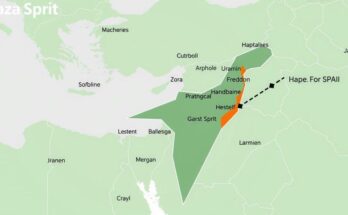The #KeepItOn coalition demands the South Sudanese government end a social media shutdown that violates human rights. The National Communication Authority’s order, in response to protests, has restricted digital access, hindering freedom of expression and emergency communications. The coalition calls on both the government and telecom providers to uphold human rights standards and restore access immediately.
The KeepItOn coalition, encompassing over 334 human rights organizations from 105 countries, is calling upon the South Sudanese government to immediately terminate the ongoing social media shutdowns. This action is currently infringing upon both national and international human rights laws and must be halted without delay. On January 22, 2025, the National Communication Authority ordered all internet service providers to restrict access to social media for a period of 90 days, citing concerns over graphic content depicting violence in neighboring Sudan. The government’s response to widespread protests and violence against Sudanese nationals in South Sudan has involved a nationwide curfew and the suppression of digital communication.
Such restrictions on critical platforms hinder free expression, as well as access to crucial health and safety information during crises. Social media is essential for the dissemination of real-time alerts and emergency services, not merely for casual communication. Furthermore, internet shutdowns obstruct the documentation of human rights violations and allow those responsible for these abuses to evade accountability. Studies show that such blockages can amplify misinformation and further exacerbate harm.
This is not an isolated incident; the South Sudanese government has previously restricted access to platforms like Facebook and WhatsApp in 2021 amidst protests related to economic difficulties. Internet service providers like MTN and Zain conveyed to customers the government’s directive for the immediate suspension of services like Facebook and TikTok.
The ongoing internet shutdowns violate both South Sudan’s constitutional guarantees of freedom of expression and international covenants that the nation has ratified. Any limitations on these rights must meet the test of necessity and proportionality, according to guidelines from the United Nations (UN) Human Rights Committee. Broad-based internet blackouts are inherently disproportionate when less restrictive methods exist for moderating content, in line with human rights standards.
Moreover, existing international resolutions affirm the critical role of the internet in upholding human rights and express concern over state actions to limit access. The African Commission on Human and Peoples’ Rights has affirmed the need for unimpeded access to telecommunication services.
Although service providers must comply with legitimate orders from the National Communication Authority, companies such as Zain, MTN, and Digitel have pledged to uphold human rights standards. By implementing the government’s shutdown, these ISPs risk complicity in furthering human rights violations and harming the South Sudanese populace.
The coalition emphasizes the need for telecom operators to resist the government’s directive through legal challenges, urging them to clarify vague terms within the order and assess its legal foundations. The rights and responsibilities of ISPs under national and international law must be thoroughly evaluated in light of this directive.
The KeepItOn coalition demands the following actions: an immediate cessation of the shutdown by the government, restoration of access to social media, and non-recurrence of network disruptions; urging telecom companies to resist governmental orders that infringe on rights; calling for social media firms to ensure careful content moderation while collaborating with local organizations to enhance emergency response mechanisms.
The article addresses the significant issue of internet censorship in South Sudan, spotlighting the government’s imposition of a temporary ban on social media as a response to civil unrest and violence related to conflicts in neighboring Sudan. The coalition’s emphasis on the importance of social media as a platform for communication during crises highlights the adverse effects of internet shutdowns on individual rights. Exploring the legal frameworks both domestically and internationally underscores the need for compliance and respect for human rights, as the coalition seeks to hold both the government and internet service providers accountable.
The ongoing social media shutdown in South Sudan represents a serious infringement of human rights and free expression, necessitating immediate action to restore access. The coalition’s demands reflect a commitment to upholding laws that protect these rights while urging telecom companies to resist government orders that undermine them. Overall, ensuring open access to communication platforms is crucial, particularly in times of crisis, to prevent further civil unrest and human rights violations.
Original Source: www.accessnow.org




